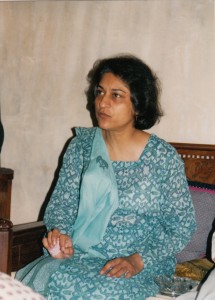[This is part 2 of an interview with the Pakistani lawyer and human rights activist, Asma Jahangir. It was conducted in Lahore on August 29, 1998, f0r my essay Countdown, which was published as a book by my Indian publisher, Ravi Dayal, in 1999.]
AG: “What would you say needs to change in Pakistan?”

Asma Jahangir: “First of all, the intrusion of religion and religious orthodoxy into the politics of Pakistan. This has never been resolved; there were always strange compromises. Secondly, the whole question of provincial autonomy (needs to be addressed).
This has hounded Pakistan’s politics, even to the extent of having lost one part of Pakistan because of the majority-empowered province’s mentality of trying to push their decisions on others. Previously these issues were sort of muffled, or they had not come to the surface because there was always a dictatorship and the smaller provinces were threatened with being called traitors if they said anything against the federation or the power of the federation. With the democratic process – and I must give credit to the Press particularly – people have begun to speak up and a debate has been generated.
“The added problem that we have is that Pakistan’s foreign policy was central to the Cold War. We have still not mentally reconciled ourselves, as a nation, to the post-Cold War scenario. We cannot think that we’ll make mistakes and somebody will come to our rescue. These rescue operations have finished, and that is something we have still not comprehended fairly and squarely. We always want to use some card or the other and it becomes a matter of habit. After this we will use the card of the Taliban and the Afghan situation; we will use the card of being an Islamic country which can go either way. But there comes a time when the world focuses on changes and people begin to leave you to your own devices.”
AG: “Meeting people here in Pakistan, I get the sense that there is a very powerful groundswell of anti-American sentiment. Yet Pakistan was one of America’s closest allies for much of the last half-century. How does one account for this?”
Asma Jahangir: “The Americans supported Zia ul-Haq, who was one of the most ruthless dictators in our part of the world. They supported his Islamisation process until the American people woke up to what he was doing to women. When Zia ul-Haq came to power he was completely backed by the Americans to back the jihad in Afghanistan. The American centre used to send scholars to lecture us on this. To the extent that we’ve heard lectures there where scholars have told us how great Saudi Arabian society was, and that women could operate within their own sphere of life. After a while people said, well, if it is such a great and romantic system, perhaps the United States needs to import it themselves.
“At that time we did not have that violent a society where kalashnikovs were easily available and we did not have this rampant a drug culture in our country. This all started with the Afghan war and the jihad. And this so-called jihad did create a very strong network of orthodoxy in our country and we are still suffering under that. So even liberals are a little bitter at the fact that these problems were created by the West. I’m not saying that one can rest on the premise that it’s the West that creates problems, and that it’s the West that can do away with our problems. We are to blame for our own follies. Except that in the case of Zia ul-Haq, it was not as though people here weren’t struggling against him. Several people got flogged, including lawyers. Several people got executed – even boys as old as fifteen. People went to jail. I do not recall any of my colleagues in the Human Rights Commission who did not go to jail at that time.
“People like us are not happy with West-bashing. The Islamists are very militant against the West because they feel that the U.S. picked them up, they made them into the custodians of the country and now they’re backing off. So they feel let down on another level. They continue West-bashing to the point where they dub people like myself as Western agents, having conveniently forgotten that then years ago they were the ones who were the direct beneficiaries of the jihad policy of the West.”

